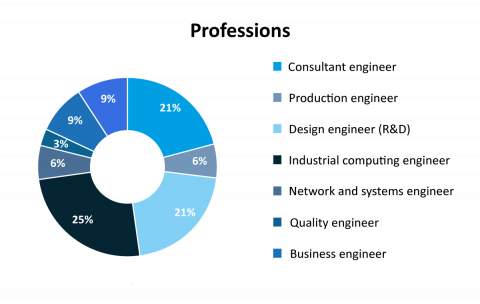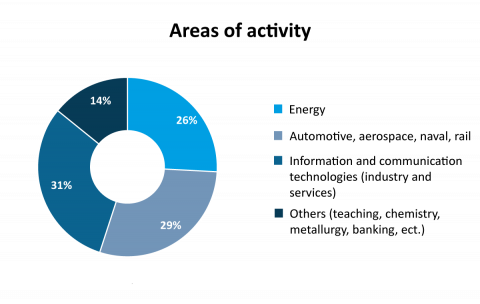
Electronics and Computer Engineering
INTRODUCTION
The power is on...
The ‘Electronics and Computer Engineering’ department at Polytech Paris-Saclay aims to train general engineers in the field of electronics where powerful digital components and software engineering are used to create multiphysics systems, interacting with the environment.
The main technical skills involved in our training are: Electronics (Analog, digital and co-design), industrial computing, software engineering for embedded systems, signal and image processing (on System On Chip), automation (for control and robotics).
Data science and Artificial Intelligence are challenges for engineers of the future. Robotics is an educational tool and a basic building block in Industry 4.0, and is also used in the field of automated transport (autonomous vehicles, trains, cars, drones, etc.)
Engineers in this field are able to understand all steps in the development process of high value-added systems in order to design a wide range of products for the general public, professionals and industry.
This training places future engineers at the heart of technological innovation. Our lecturers are world-wide experts researchers and Industry engineers in cutting-edge technology training. In addition, our students benefit from an international placement (or exchange) with our partners (12 weeks for students and 8 for apprentices).
Download the presentation file:
Core curriculum
The ‘Electronics and Computer Engineering’, ‘Computer Science’, ‘Materials: Mechanics and Energy’ and ‘Photonics and Optronic Systems’ courses include a common core designed to help future engineers better understand the companies’ requirements and processes. Throughout the course, business is studied from several points, including economics, finance, marketing, communication, R&D, management and languages, etc.
Ask for the program!
Going further
There are many options for joint degrees or additional training available to our students in the form of Master’s courses at the Université Paris Saclay and its parteners as ENS Paris-Saclay, CentraleSupélec, IOGS, as well as ENSTA, and IAE of Paris.
You can also study for a PhD (with Academic or CIFRE fundings or other) - in particular those who have obtained a Master degree in parallel (during the last year level).
Students can benefit from many international links enjoyed by the school and Universit Paris-Saclay, and enjoy international travel (minimum of three months required during the course) either for periods of study abroad or to carry out work placements outside France.
IN SUMMARY
Skills
Electronic systems engineering
Electronics, sensors, computers, actuators
Image and signal processing
Automation and robotic systems
Industrial computing and embedded systems
Applications
Embedded and mobile systems
Industrial Informatics and real time computing
Networks and communicating systems
Signal and image processing
Software/Hardware co-design
Electronics and energy
Remote control
Mechatronics & digital systems
Electronic interfaces
Robotic systems Applications
RNCP (National Directory of Professional Certifications)
For the engineering degree from the Ecole Polytechnique at the University of Paris XI, Electronics specialisation (undergraduates): https://www.francecompetences.fr/recherche/rncp/38847/
INTEGRATION INTO THE LABOUR MARKET

Survey of graduates at 6 months - Average over 3 years

